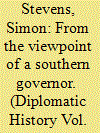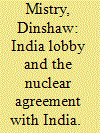| Srl | Item |
| 1 |
ID:
121170


|
|
|
|
|
| Publication |
2012.
|
| Summary/Abstract |
The Carter administration's adoption of an approach towards the South African government's policy of apartheid that was, as Jimmy Carter put it, "correct but as easy on them as possible," cannot be explained solely by American economic and strategic interests in the region or by the administration's desire for South Africa's cooperation on nuclear nonproliferation and the resolution of the conflicts in neighboring Rhodesia and Namibia. The lessons Carter and Ambassador to the United Nations Andrew Young drew from their earlier personal experiences in the American South in the 1960s were also of great significance. Those experiences not only gave Carter and Young a strong commitment to ending apartheid in South Africa but also strongly influenced the ways in which they thought that objective might be achieved. First, Carter and Young had considerable sympathy for the position of white South Africans and were concerned to work with them toward peaceful change in a spirit of cooperation rather than confrontation. Second, they believed that American businesses could have a positive impact on race relations in South Africa. They therefore encouraged American investors to adopt "enlightened employment practices," and resisted pressure from anti-apartheid activists to impose economic sanctions.
|
|
|
|
|
|
|
|
|
|
|
|
|
|
|
|
| 2 |
ID:
126700


|
|
|
|
|
| Publication |
2013.
|
| Summary/Abstract |
IN JULY 2005, REVERSING DECADES OF U.S. nuclear nonproliferation policy, President George W. Bush announced a commitment to attaining "full civilian nuclear energy cooperation and trade with India."1 In November 2006, Congress passed the Henry J. Hyde United States-India Peaceful Atomic Energy Cooperation Act and, in October 2008, approved the necessary follow-on legislation, to formally permit civilian nuclear trade with India. The nuclear agreement with India was a major U.S. foreign policy initiative, and Indian Americans strongly lobbied Congress to approve this agreement. To some, this advocacy effort heralded the emergence of Indian Americans as a leading ethnic lobby that could substantially influence future U.S. foreign policy
|
|
|
|
|
|
|
|
|
|
|
|
|
|
|
|
| 3 |
ID:
089403


|
|
|